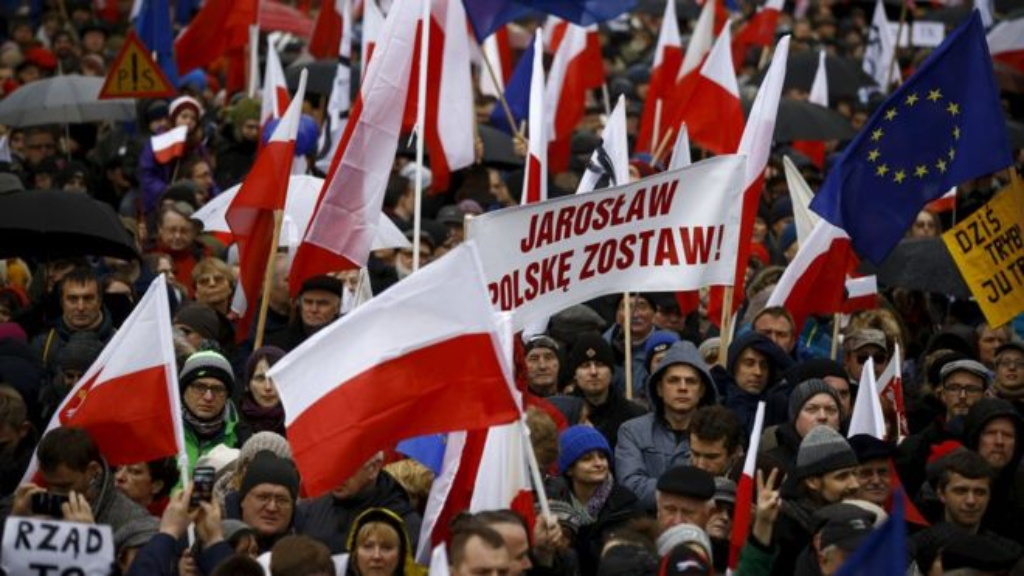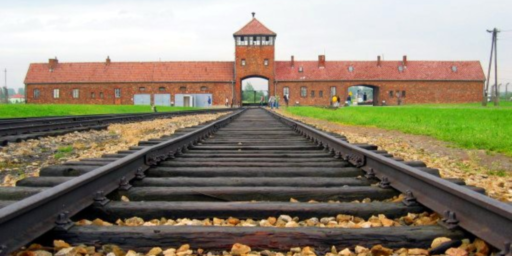Poland’s Right-Wing Government Purges Government Critics From Judiciary
The right-wing government in Warsaw has purged more than one-third of the members of the Polish Supreme Court in a crackdown on political opponents.

Defying the European Union while at the same arousing protests inside their own county, Poland’s right-wing government has purged the nation’s Supreme Court of more than one-third of its members, most of whom had been part of rulings critical of government policies:
WARSAW — Poland’s government carried out a sweeping purge of the Supreme Court on Tuesday night, eroding the judiciary’s independence, escalating a confrontation with the European Union over the rule of law and further dividing this nation. Tens of thousands took to the streets in protest.
Poland was once a beacon for countries struggling to escape the yoke of the Soviet Union and embrace Western democracy. But it is now in league with neighboring nations, like Hungary, whose leaders have turned to authoritarian means to tighten their grip on power, presenting a grave challenge to a European Union already grappling with nationalist, populist and anti-immigrant movements.
The forced retirements of up to 27 of 72 Supreme Court justices, including the top judge, and the creation of a judicial disciplinary chamber were the latest in a series of steps by Poland’s right-wing Law and Justice Party to take over the justice system.
For years, the party has demonized judges as unreconstructed Communists and obstructionists. After coming to power in 2015, it took control of the Constitutional Tribunal, which is tasked with ensuring that laws do not violate the Constitution, and gave authority over the country’s prosecutors to the Ministry of Justice. Most recently, it asserted new powers to select judges. In recent days, judges who have spoken out against the changes have reported being harassed and intimidated.
Each move has been greeted with international condemnation and angry demonstrations.
Hours before the purge took effect at midnight, Poles again took to the streets in more than 60 cities and towns around the country. As the sun set in Warsaw, crowds gathered in front of a memorial dedicated to those who died in the city’s 1944 uprising against Nazi Germany, chanting an old but familiar refrain: “Solidarnosc.”
But now, calls for solidarity were not directed at an occupying force — or at Communist rule, which the labor-backed Solidarity movement brought down in 1989 — but at a democratically elected government, albeit one the demonstrators fear is undermining the system they fought so hard to build.
“We are here because of the destruction of the judiciary in Poland,” said Kamila Wrzesinska, who stood amid a sea of Polish and European Union flags. Organizers passed out placards with one word: “Constitution.”
In an interview just days ago, the leader of the Supreme Court, Malgorzata Gersdorf, expressed deep concern about her country’s direction.
“I don’t want to say that I am terrified,” she said, “but without a doubt this is not a direction I would like to go in, nor support, as I think it destroys what has been built over the last 25 years.”
The new law passed by Parliament requires that judges retire when they turn 65 unless they appeal to the country’s president, Andrzej Duda, who has sole discretion over whether they can remain.
At least one member of the body is refusing to comply with the Government’s order:
WARSAW — Surrounded by hundreds of cheering supporters, Poland’s top Supreme Court justice took a defiant stand on the courthouse steps here Wednesday morning and vowed to keep fighting to protect the Constitution and the independence of the nation’s courts.
“We emphasize our attachment to the rules of a democratic state,” the justice, Malgorzata Gersdorf, said as throngs of reporters and scores of police officers crowded around her.
Although the government had effectively put her out of a job after a sweeping set of new rules aimed at the judiciary took effect at midnight on Tuesday, the authorities did not prevent her from entering the building, a move that at least averted the image of a 65-year-old justice being handled roughly by the police.
The new rules lower the mandatory retirement age for judges to 65 from 70, which could force out nearly half of the Supreme Court justices, and they call for a disciplinary chamber to be established, raising fears that the governing Law and Justice Party will use the new directive to intimidate judges.
Law and Justice, which has sought for years to take over the judiciary and resorted to authoritarian means to maintain and enhance its grip on power, said it would soon name judges to replace those now obligated to retire.
Jaroslaw Kaczynski, the leader of the party, said that Justice Gersdorf and her supporters were “doomed to fail miserably.”
“But I observe these feats with calm,” he told the right-wing newsweekly Gazeta Polska in an interview published on Wednesday.
He was also undeterred by the threats of sanctions by the European Union, which he accused of trampling on Poland’s sovereignty, with the larger members of the bloc using their power to “brutally exert pressure” on smaller and weaker ones.
The Polish prime minister, Mateusz Morawiecki, speaking at the European Parliament on Wednesday, defended the new laws and expanded on the criticism of the bloc.
“Many Europeans don’t like the direction the European Union is going in,” he said. “When they feel that they’re losing influence on the future of Europe and the world, then they’re going to oppose what’s happening.”
“You can call that populism,” he said, “but at the end of the day, we are going to have to ask questions asked by citizens and their expectations.”
In the crowd outside the Supreme Court, protesters waved European Union flags and held cardboard shields inscribed with the word “Konstytucja,” or “Constitution,” hoping the document would provide a basis for them to prevail, but it was unclear where things would go from here.
This isn’t the first confrontation that the Law And Justice Party has had with Poland’s Judiciary since taking power, and as the party seeks to advance its agenda and maintain its hold on power, it’s unlikely to be the last. In 2015, the government launched a similar attack on Poland’s Constitutional Tribunal, which is charged with the task of ensuring that the laws passed by the Polish Parliament are in compliance with the nation’s Constitution. Ordinarily, for example, laws that pass the legislature are submitted to this tribunal which is required to certify that the proposed law is in compliance with the Constitution before it can be signed into law by Poland’s President, although there are apparently ways to get around this procedure since the tribunal did not rule on the Holocaust law that has caused international concern since being passed in January, In any case, three years ago the Polish government purported to make changes to the manner in which Judges to the tribunal are selected and the circumstances under which they can be removed from office. As is happening now, these moves led to widespread protests as well as warnings from the European Union. (Source)Despite this, though, the government was largely successful in remaking the Constitutional Tribunal in its own image and now they appear to be attempting to do the same thing with the rest of the Polish Judiciary.
As was the case in 2015, the Polish government’s moves against the Supreme Court, which it has been telegraphing for months, has set the nation on a collision course with the European Union, which has been dealing with an uprising of right-wing populist government critical of the E.U. as well as the ongoing issue of the United Kingdom’s exit from the bloc within the next several years. On the first count, right-wing government critical of the E.U. have risen to power in nations such as Austria and Italy, and Angela Merkel has faced a political firestorm in Germany due to the influx of migrants to that country due in no small part to the fact that other European nations have effectively shut their door. The issue appears to be particularly stark in Eastern Europe where, in addition to Poland, Hungary has also seen the rise of authoritarian government driven in no small part by the migrant crisis resulting from the war in Syria. v
The obvious concern in Brussels is that failure on the E.U.’s part to make Warsaw pay a price for what it is undertaking with regard to consolidation of power in the hands of the ruling party will lead to similar moves in other parts of Europe, thus threatening the democratic values that the union is built upon. What’s unclear, though, exactly what the E.U. can do about what’s happening in Poland. On Monday, officials in Brussels announced that it had initiated “infringement procedures” against the Polish government. That move could result in the issue being referred to the European Court of Justice, which could declare these moves to reformulate the Polish Judiciary unconstitutional. However, that Court lacks the authority to enforce any such ruling. The union is also apparently considering invoking Article 7 of the E.U. treaty, which allows the union to impose sanctions, including the lose of voting rights in E.U. affairs, on nations that act in a manner in violation of the treaty or in contravention of the values of the union. Such a move, though, would require a unanimous vote by the entire membership and given the fact that governments sympathetic to the right-wing government in Poland would be unlikely to consent to such a move.
As noted above, these moves have resulted in somewhat of a popular uprising against the central government, and those protests have garnered support from none other than Lech Walesa, the leader of the Solidarity movement that brought about the end of Communist rule in Poland. Earlier this week, Walesa vowed to lead a civil disobedience movement against the government if it took the steps against the Judiciary that it was threatening. In a statement on Facebook, for example, Walesa said ”I am saying a definite ‘enough’ to this…….If they raise their paws against the Supreme Court, then I am going to Warsaw.” Where these protests lead is unclear. The central government seems fairly well ensconsed in power and has supporters of its own. Nonetheless, this could be the beginning of something interesting in Poland.




And meanwhile, the Annoying Orange in the White House is taking notes.
It feels like the sun is setting all over the world.
I’m less concerned with the EU than I am with NATO. Poland, Hungary and Turkey can no longer be considered democracies. If we had a president who was not a Russian tool we could perhaps apply some countervailing pressure. But of course the destruction of NATO is central to the Putin-Trump foreign policy, so we’ll say nothing and do nothing, as yet another vital post-war institution is destroyed.
@Michael Reynolds:
Poland is pretty much a buffer between Russia and Western Europe. It doesn’t have to be a democracy to be part of the alliance, it just needs to want to avoid being taken over by Russia.
But one means to avoid it is to join in an alliance with Russia. This would leave Western Europe without a buffer, and place Russian troops and bases at its border.
With NATO as is, this wouldn’t matter much. But as Dennison seems intent on bringing NATO down, well, fuck.
I don’t think the Poles would like to ally with Russia. Remember Poland has been partitioned multiple times by conquerors, and every time Russia had a hand in it.
Actually, the ones who should be taking notes are the immature sucks over here who call themselves the Resistance. This is what it looks like when adults get ready to hit the streets. And they’re not going to wear stupid black stockings over their heads either. Thirty years ago Walesa and his peers looked certain death in the eye and didn’t flinch. He’s done and said dumb things since the mid-1980’s but Walesa knows how to really protest. God bless ’em all!